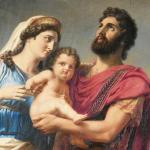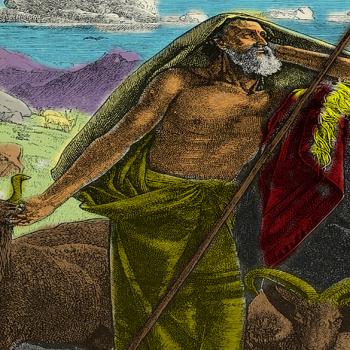 Never smile at a crocodile and never fight with a man experiencing the Day of Glory.
Never smile at a crocodile and never fight with a man experiencing the Day of Glory.
In Iliad some heroes are better fighters than others: Paris should not fight even an average Greek hero. Achilles can kill anyone and will only be slain by the will of Zeus: bad fate. No hero who is not a Demi-god should take on a god, but there is one exception to these general rules: the Day of Glory. A solid hero like Diomedes will become the favorite of a goddess such as Athena and become more than he usually is. For one shining season, he is (nearly) invincible and lesser gods and heroes not named Achilles should not face the man on his Day of Glory.
Homer has noticed a deep truth: sometimes a person gets on a roll. Whatever your spiritual explanation for this run, there is wisdom in staying out of the way of such a man. There is general wisdom in the rules of Homeric battle. A person should know his place and not take on fights beyond his ability. This is a piece of the Socratic “know thyself.” People are not gods and we should not take on divinity or aspire to divine status.
A man is just a man and when he draws the attention of the gods, trouble results. The Homeric gods are not God, being a different sort of being from God. They bleed, eat, and are not all powerful, not even Zeus. Do they exist? Possibly, but if they do, no human should want to attract their hatred or just as dangerous their love. Paris becomes a favorite of Aphrodite and this gets him what he wants, sex with the most beautiful woman in the world, but also dooms his city and him to ruin. The favor of Aphrodite comes with the hatred of Athena and Hera.
If the gods exist, then they are fickle. They elevate first one side in the battle and then another. The Greeks are fated to defeat the Trojans, but to settle scores, Zeus allows the Trojans their moments of victory.
Is Homer merely personalizing luck? Why does it seem that luck will come and then inevitably leave? Much s0 called luck is randomness to which humans (falsely) ascribe patterns, yet obviously certain things we can do make a good outcome more probable. If you dress up like Achilles but cannot fight like he fights, then you will attract undue attention from Trojan heroes and not be able to take it. You might get out of it, but the odds are not in your favor. When Patroclus puts on Achilles’ armor, he is not unlucky when he dies, he is wearing armor that promises power he cannot deliver.
There is a residue of events that do not seem mere chance or the result of our wills. Do other wills exist? Other animals, angels, devils, gods, and God would be examples of wills that could influence our lives. If these wills interact with ours, then much that seems inexplicable might have an explanation. We should not be hasty to see devils egging on a bad event or angels helping us, but we need not ignore evidence that points in that direction either. Miracles happen, after all.
And yet the “day of glory” is not something to desire in this life.
Foolish people often wish to attract a “day of glory.” They hope to get on a roll by attacking the favor of gods, but even if the gods exist, Homer points out there is no sure way to win their favor nor is it safe to do so. The gods might accept your sacrifice or they might ignore it. In the end, the gods do (in Homer) what they intend to do pretty much regardless of human attempts to control them.
God can bless us, but if by blessing we mean ease or comfort (let’s not put either down!), then we know that sometimes a “blessing” is not a blessing. Ask ancient Israel who often found times of prosperity the hardest in terms of spiritual growth. No pain is not a gain, though again in this broken world there is too much pain. We do not ever have to root for pain, since pain comes as surely as death.
The only safe day of glory is the last day of a man’s life, if he is glorified by God. The fight is over and joy awaits. Against that day of glory no angel, demon, or god can fight or will fight. We will be with God forever and luck will be unneeded world without end . . .Amen.
















